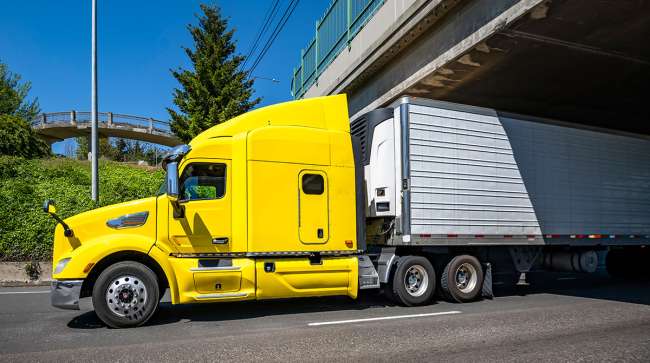Staff Reporter
Connecticut Law Will Halt Hefty Tax on Commercial Vehicles

[Stay on top of transportation news: Get TTNews in your inbox.]
Commercial vehicle owners in Connecticut will be protected from a doubled tax rate that would have happened in October but was avoided due to a recently enacted law by Gov. Ned Lamont.
A threat of a spike in commercial motor vehicle taxes for businesses was linked to a 2022 law that would have made commercial motor vehicles become personal property of a business instead of it being categorized as a motor vehicle under state tax laws.
Lamont thwarted this scenario July 1 by approving Senate Bill No. 501, a broad measure that included commercial motor vehicles assessments, tax underpayments, insurer taxes, procedures for historic preservation officers, school building projects and a charter for a water authority. The Democrat-backed bill was sponsored during a special session tacked onto the end of the 2024 legislative session (which adjourned May 8 after convening Feb. 7) by state Sens. Martin Looney and Bob Duff along with state Reps. Matthew Ritter and Jason Rojas.
Without the new law, the commercial vehicle classification shift would have subjected an entire motor vehicle’s value from a capped mill rate to a personal property mill rate.
“This would have subjected business owners in over 50 towns that have personal property mill rates higher than the capped 32.46 mills motor vehicle mill rate to higher taxation on their commercial vehicles. In high mill rate towns like Hartford (68.95 mills), this would have led to a more than doubling of the annual tax rate on the commercial vehicles,” said Chris Davis, vice president of public policy at Hartford-based Connecticut Business & Industry Association.

Davis
“In addition to the increased tax burden, we were concerned that such a tax increase in certain municipalities would lead to affected businesses relocating their vehicles to lower-taxed municipalities or out-of-state, thus eroding the local tax base and state registration receipts,” Davis said. Additionally, fleet vehicle owners would have been required to declare all vehicles on burdensome handwritten personal property declaration forms, and, if any vehicle had a delinquent tax bill, state registrations for the entire fleet would be delayed, preventing commercial businesses from re-registering vehicles and potentially halting operations.”
The motor vehicle mill rate cap is part of the municipal revenue-sharing program. Prior to implementing the cap nearly a decade ago, municipalities and special taxing districts taxed motor vehicles the same as other taxable property, such as real estate and personal property.
“A taxpayer in one town could receive a substantially higher tax bill than a taxpayer in another town for an identical vehicle, even though the vehicles’ values were the same, due to the varying mill rates in each town,” Davis said. “Implementation of the cap significantly reduced the motor vehicle tax burden in towns with mill rates higher than the cap. The current cap is 32.46 mills.”
Jeff Loftus of FMCSA joins TT’s Seth Clevenger to discuss the current outlook on ADAS technology and how it will affect the industry at large. Tune in above or by going to RoadSigns.ttnews.com.
Now Public Act No. 24-1 will take effect Oct 1.
“The adoption of the new depreciation schedule will lead to a more predictable assessed value over time, helping businesses better budget for their tax liability without the fear of a sudden change in valuation,” Davis said.
CBIA worked with the Motor Transport Association of Connecticut (MTAC) to support the legislation preventing the tax change. CBIA is the largest business advocacy organization in Connecticut and third largest in the nation. It has thousands of small and large member companies statewide representing a diverse range of industries, including the trucking and motor transport industry. Also based in Hartford, MTAC represents nearly 1,400 companies. It was founded in 1920 with fewer than 20 members.
“It is efforts like these that demonstrate the value of membership in organizations like CBIA and the ATA [American Trucking Associations] and how we as business advocacy organizations can achieve positive results for our members,” Davis said.
Want more news? Listen to today's daily briefing below or go here for more info:





